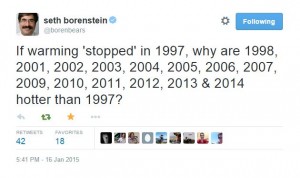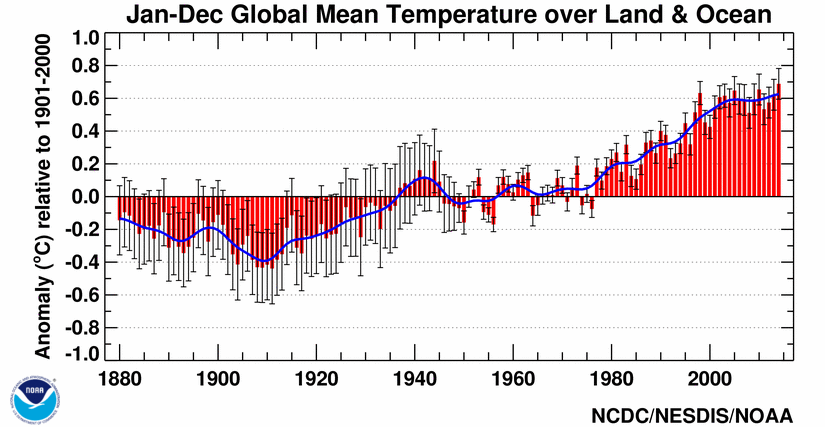This week, NASA and NOAA announced both had calculated that 2014 was the hottest year on record for Earth. This news was part of the ongoing public conversation about climate change, which is much more of a debate in the general public than among scientists, the vast majority of whom have come to the consensus that climate change is real, caused by humans, and an existential threat to our existence and the existence of millions of other species on the planet.
One reason it is news that 2014 is the hottest year on record is that so many recent years have also been among the hottest. This is evidence for the reality of global climate change, which many of our current elected officials deny, and for it being caused by humans, which is even more controversial in public policy circles. NOAA released this temperature graph:
 Others have mapped levels of carbon dioxide onto the graph to show a strong correlative relationship. This is from Greg Laden:
Others have mapped levels of carbon dioxide onto the graph to show a strong correlative relationship. This is from Greg Laden:
Either way, the graph shows a definite pattern from the time global temperatures started being recorded in 1880 to the present. Since 1978 the Earth has not experienced a single year with a global temperature lower than the historical average.
Seth Borenstein, an AP science writer who I’ve been following since he was at the Miami Herald in the late 90s, wrote the main story about the NOAA and NASA announcement, including interviews with a number of climate scientists. But he also wrote a very interesting sidebar to the story. He decided to look at the statistical probability that the pattern of warming we see in the graphs above is random, occurring naturally, or if there is another explanation.
Borenstein talked to a number of statisticians who told him the following:
- With global average temperature records spanning from 1880 to 2014, the odds of 2014 by itself being the warmest on record are 1 in 135.
- The three hottest years on record — 2014, 2010 and 2005 — have occurred in the last 10 years. The odds of that happening randomly are 3,341 to 1.
- Nine of the 10 hottest years on record have occurred in the 21st century. The odds of that being random are 650 million to 1.
- Thirteen of the 15 the hottest years on record have occurred in the last 15 years. The odds of that being random are more than 41 trillion to 1.
- All 15 years from 2000 on have been among the top 20 warmest years on record. They said the odds of that are 1.5 quadrillion to 1. A quadrillion is a million billion.
- The last 358 months in a row have been warmer than the 20th-century average. The odds of that are so high — a number with more than 100 zeros — that there is no name for it.
Other than the first number, neither Borenstein nor the statisticians tell us how they made their calculations. I assume they took the number of years in the historical record (135) and somehow multiplied this by the odds of each year considered being among the warmest. For example, chances of the hottest three years being in the last decade would involve calculating the odds of each year being in the hottest three and of the last decade being among the hottest.
Although it would be interesting to see how the statisticians made these calculations, clearly something is going on in the earth’s climate that is way beyond random chance. Climate scientists have considered a number of possibilities not discussed in this article, and ruled out all but human activity. For example, it’s not the sun because the warmest temperatures are on the surface, not in the stratosphere, and the sun’s temperature has actually been cooling. It is not natural cycles because those occur at a pace of hundreds of thousands of years, not decades.
 Yet despite this evidence, climate change deniers are still denying the science. Rep. Dana Rohrbacher (R-Calif.) tweeted that the findings of NOAA and NASA were “yet more fraud.” And climate deniers descended on Seth Borenstein’s Twitter page, repeating the claim that global warming “paused” in 1997. The temperature graphs show differently, but facts don’t seem to matter to a lot of these people. Finally an exasperated Borenstein tweeted:
Yet despite this evidence, climate change deniers are still denying the science. Rep. Dana Rohrbacher (R-Calif.) tweeted that the findings of NOAA and NASA were “yet more fraud.” And climate deniers descended on Seth Borenstein’s Twitter page, repeating the claim that global warming “paused” in 1997. The temperature graphs show differently, but facts don’t seem to matter to a lot of these people. Finally an exasperated Borenstein tweeted:
It certainly is a point worth considering. And though steadfast deniers will never change their minds, there is a large confused public in the middle who can be educated and who need to start understanding the importance of acting on climate change.
